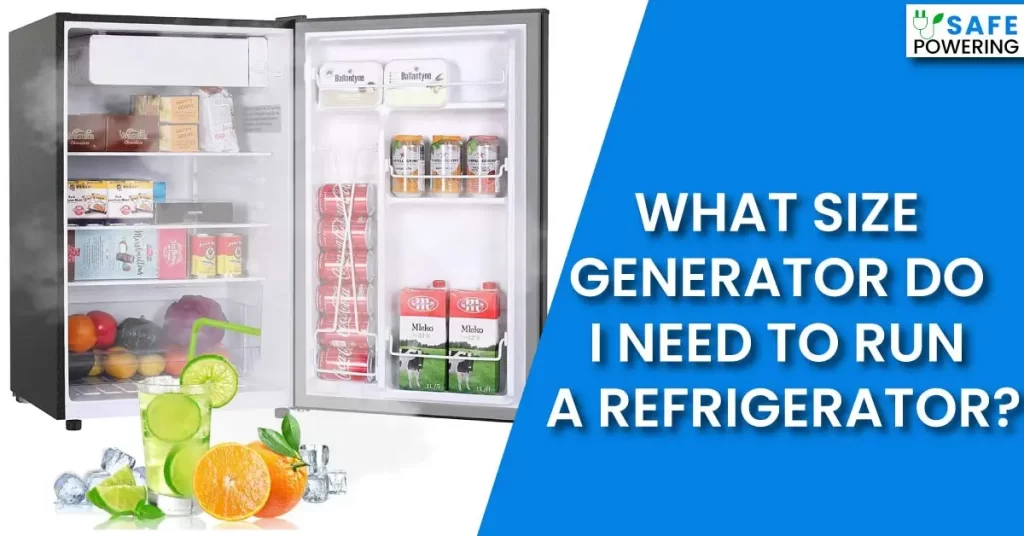What Size Generator Do I Need To Run A Refrigerator?
Whether you’re a homeowner preparing for a storm or a camper heading off the grid, running a refrigerator is essential for keeping your food fresh and your drinks cold.
But to power your fridge, you’ll need a generator with enough capacity to handle its energy needs.
Choosing the right generator size can be a challenge, as it depends on factors like the refrigerator’s power consumption, start-up wattage, and run time.
With the right knowledge and tools, however, you can ensure that you have the right generator to meet your needs and keep your food and beverages cool and safe.
In this guide, we’ll explore the key considerations for determining what size generator you need to run a refrigerator.

What Size Generator Do I Need To Run A Refrigerator and Freezer?
The wattage of the generator you need depends on the size, model, and features of your fridge. For small or mini-fridges, a 1000-watt generator can provide enough power. However, for medium and large refrigerators with multiple features like icemakers and dispensers, you’ll need to invest in a generator with a higher wattage. A 2000-watt generator is typically sufficient, while larger models will require a unit with a capacity of 5000 watts or more.
How Many Watts Does a Refrigerator/Freezer Use?
The amount of power, measured in watts, used by a refrigerator or freezer depends on several factors, including the size, model, and age of the unit, as well as its energy efficiency rating.
First, we need to understand starting watts and running watts.
Starting watts and running watts are two measurements used to describe the power requirements of an electrical device.
Starting watts, peak watts, or surge watts refer to the amount of power a device requires to overcome inertia to start up or turn on.
Running watts or rated watts refer to the amount of power required to keep the device running.
Refrigerators/Freezers Wattage Comparison Table
| Model & Type | Starting Watts | Running Watts |
| Mini Fridge | 50 – 100 | 150 – 200 |
| Standard Mini Fridge | 75 – 150 | 300 – 400 |
| Big Mini Fridge | 100 | 400 |
| Modern Fridge | 100 – 400 | 150 – 600 |
| Counter Top Fridge | 160 | 240 |
| Side By Side Fridge | 650 – 800 | 1000 – 1100 |
| Old Fridges | 200 – 800 | 300 – 1300 |
| Refrigerator Showcase | 210 | 315 |
| Mini Glass Refrigerator | 140 | 210 |
| Deep Freezer | 300 – 500 | 530 – 750 |
How to Calculate the Refrigerator’s Wattages Manually?
Here’s a step-by-step guide to calculating your refrigerator’s wattage manually:
Step 1: Check the Power Consumption
Check the Refrigerator’s Label or Manual Check the energy label or manual of your refrigerator for information on its power consumption.
You should be able to find the power rating in either watts or amps.
Step 2: Calculate the Running Watts and add 20%.
Once you have the power consumption in watts or amps, you can calculate the running watts.
To calculate the running watts, multiply the amps by the volts (typically 120 volts in North America) or multiply the watts by 1.0 (since running watts and power consumption in watts are usually the same).
Step 3: Determine the Starting Watts
Many refrigerators require more power to start up than they do to run continuously. Check the label or manual for information on the starting watts required for your refrigerator.
If this information is not available, a good rule of thumb is to assume that the starting watts will be 2-3 times the running watts.
Step 4: Choose the Right Generator
Now that you know the running watts and starting watts required for your refrigerator, you can choose the right size generator to meet your needs.
Make sure to choose a generator with enough starting watts to accommodate your refrigerator’s power requirements during start-up.
Example: A refrigerator that requires 650 starting watts and 1000 running watts. Using the formula Watt = Amp x Volt, we can calculate the wattage requirements for this refrigerator.
Starting Watts: 650/120 = 5.42 Amps Watts = 5.42 x 120 = 650.4 watts
Running Watts: 1000/120 = 8.33 Amps Watts = 8.33 x 120 = 999.6 watts
To account for power losses, we need to add 20% extra wattage to these values:
Starting Watts: 650.4 x 0.2 + 650.4 = 780.48 watts
Running Watts: 999.6 x 0.2 + 999.6 = 1199.52 watts
Therefore, to run this refrigerator, you would need a generator with a minimum capacity of 1200 watts.
It’s important to note that if you plan to power additional appliances, you should factor in their wattage requirements as well to determine the overall capacity of the generator needed.
Things to be Considered Before Purchasing a Generator for a Refrigerator
Before making a decision to buy a generator for your refrigerator, there are several important factors you should consider.
- The size of your refrigerator is a crucial factor in determining the generator’s size. A larger refrigerator, especially one with side-by-side doors, will require more wattage compared to a standard-sized refrigerator.
- You should also check the amperage rating of your refrigerator before purchasing a generator. A standard-sized generator has a 15 or 20 Amp outlet, while a larger generator has 30 or 50 Amps.
- If you have an older refrigerator model from the nineties, it may consume more power compared to newer, more energy-efficient models. Therefore, it’s important to spend a few extra bucks to get a bigger generator for it.
- If you plan on running multiple appliances simultaneously, consider purchasing a larger generator that can handle the power demand. Also, refrigerators with built-in freezers consume more power compared to refrigerators with no freezers.
- Smart controls and sensors in a refrigerator can also increase its power consumption, as well as the need for extremely low THD. Moreover, refrigerators with additional features such as water dispensers and icemakers also require more wattage to run.
Recommended Read: What Size Generator Do I Need To Run A House?
How Long Can a Generator Run a Refrigerator?
Firstly, it’s important to know the power consumption of your refrigerator. This information is typically listed on the appliance’s label or in the user manual.
For example, a typical household refrigerator might consume between 1000 and 2000 watts per day.
Next, you’ll need to determine the power output of the generator.
To ensure the generator can handle the refrigerator’s power needs, it should have a power output that is greater than the refrigerator’s power consumption.
Assuming you have a generator that can handle the power requirements of the refrigerator, the length of time the generator can run the refrigerator will depend on the generator’s fuel capacity and efficiency.
For example: If your generator has a fuel capacity of 5 gallons and consumes 0.5 gallons of fuel per hour, it can run for approximately 10 hours. However, if the generator is less efficient, it will burn fuel faster and run for a shorter period of time.
Let me give a more detailed information
For 2000W Generator:
Let’s assume the refrigerator consumes 1400 watts per day, and the 2000W generator has a fuel capacity of 1.5 gallons and consumes 0.25 gallons of fuel per hour.
The generator could run the refrigerator for approximately 6 hours before requiring a fuel refill.
See what else can a 2000W generator run.
For 3000W Generator:
Suppose the refrigerator consumes 1400 watts per day, and the 3000W generator has a fuel capacity of 3 gallons and consumes 0.35 gallons of fuel per hour.
The generator could run the refrigerator for approximately 8.5 hours before requiring a fuel refill.
See what else can a 3000W generator run.
For 5000W Generator:
Suppose the refrigerator consumes 1400 watts per day, and the 5000W generator has a fuel capacity of 5 gallons and consumes 0.5 gallons of fuel per hour.
The generator could run the refrigerator for approximately 10 hours before requiring a fuel refill.
We have also a guide about “What can a 5000W generator run“.
Frequently Asked Questions (FAQs)
What Size Generator Do I Need to Run a Mini-Fridge?
A 1000-watt generator would be enough to operate a mini-fridge. A bigger generator won’t hurt, but whether it is a solar generator or a conventional inverter generator, this size should be enough.
What Size Generator Do I Need to Run a Standard-Sized Refrigerator?
For a standard-sized refrigerator, a generator of 2000 watts would be sufficient to start and run it.
Can I Use a 1000-Watt Generator to Run a Large Refrigerator?
A 1000-watt generator is not powerful enough to run a large refrigerator. You will need a generator of at least 5000 watts to run a large refrigerator with multiple functions like an icemaker and dispensers.
Can I Use a Smaller Generator Than Recommended for My Refrigerator?
Using a smaller generator than recommended for your refrigerator can damage both the generator and the appliance. It’s always best to use the appropriate size of generator recommended for your refrigerator.

Fareed, the highly skilled electrical expert, boasts 5 years of extensive experience in proficiently maintaining, repairing, diagnosing, and installing a diverse range of electrical systems.
